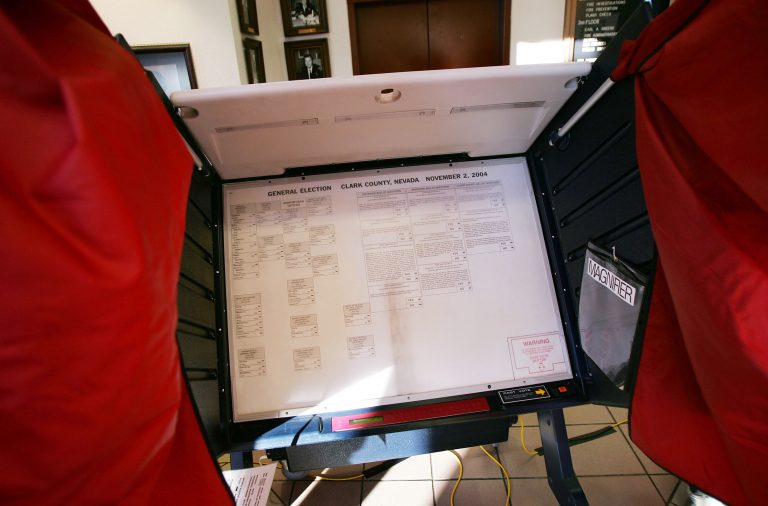A 2012 filing of the Bankruptcy Court for the District of Colorado stated that Sequoia Voting Systems was “indirectly owned by Venezeulan citizens” before restructuring into a shell company to evade US regulators. Smartmatic, the software company that operates Dominion voting machines, acquired Sequoia in 2005.
Tracy Beanz, editor-in-chief of UncoverDC, posted screenshots of the filing on her Twitter account exposing Sequoia’s past.
The Objection to Smartmatic’s Motions for Authority and Standing to Prosecute Causes of Action was between SVS Holdings and Smartmatic USA Corporation. SVS Holdings was a shell company with no employees; its sole purpose was to hold shares of Sequoia.
The overview of the filing illustrates a long-standing feud between Smartmatic and Dominion caused by the licensing of Dominion’s technology in the 2010 Philippines election.
“Smartmatic’s motions are largely designed to increase litigation leverage for a pending action Smartmatic initiated against Dominion Voting Systems, Inc. in Delaware involving allegations of $20 million in damages,” the filing reads.
Success
You are now signed up for our newsletter
Success
Check your email to complete sign up
Sequoia, Smartmatic, and Dominion had “largely been in direct competition, seeking to sell voting systems to local and national governments worldwide.”
The filing states that SVS acquired Sequoia from Smartmatic in 2007 after Smartmatic purchased it in 2005.
The sale came about when “In 2006, various political issues arose, and United States authorities became aware that Sequoia, through Smartmatic, was indirectly owned by Venezuelan citizens. The U.S. Committee on Foreign Investment in the United States (CFIUS) began reviewing Smartmatic’s purchase of Sequoia.”
Smartmatic then sold Sequoia to the SVS Holdings shell company. It was restructured to evade CFIUS oversight.
“To resolve potential issues with CFIUS, in 2007, Smartmatic transferred Sequoia to a new company formed for the acquisition, owned by U.S. citizens who were part of Sequoia’s management. The new company was debtor [SVS Holdings].”

RONALDO SCHEMIDT/Getty Images </a> via <a href=https://www.gettyimages.com/search/photographer?assettype=image&family=editorial&photographer=RONALDO%20SCHEMIDT&sort=mostpopular#license> Getty Images </a>)
A 2008 lawsuit between SVS and Smartmatic revealed that SVS gave Smartmatic a $2 million “unsecured promissory note” in exchange for 100% of the shares of Sequoia.
SVS Holdings was also required to continually supply cash to Smartmatic as a term of the sale.
The bankruptcy filing noted that while Smartmatic was pursuing claims against Sequoia in 2009, Smartmatic entered into a licensing agreement with Dominion’s “optical scan voting systems.” One purpose of the deal was to secure a contract for the 2010 elections in the Philippines.
Smartmatic was competing against Sequoia at the time and was awarded the contract. Smartmatic was essentially competing against itself and drove its own subsidiary into bankruptcy.
This licensing agreement and the terms inherent became the basis of Smartmatic’s complaints against Dominion after “various allegations of technical difficulties” plagued the 2010 Philippines election. Both Smartmatic and Dominion sued each other for alleged breaches under the licensing agreement.
Independent journalist Tracy Beanz screenshot a Wikipedia entry, which elaborated on the difficulties of the 2010 election. The Manilla Times called Smartmatic’s systems “unreliable, glitchy, and vulnerable to tampering” while also “funneling voter information through ‘unofficial servers’.”
The disruptions were so enormous that the newspaper publicly called on the country’s electoral body, Comlec, to resign.
The Philippines election irregularities hold striking similarities to the many sworn affidavits alleging fraud in battleground states during the Nov. 3 U.S. presidential election. Dominion machines were used in these states.
Despite the extensive problems with Smartmatic and its use of Dominion machines, Wikipedia states that Comlec continued to contract Smartmatic through 2016 and 2017.
Philippines research organization IBON Foundation found “allegations of rigged bidding to favor Smartmatic such as designing contracts where only Smartmatic can qualify or omitting requirements that would otherwise disqualify Smartmatic.”
“Why Smartmatic keeps on winning Comlec contracts boggles the mind especially considering the numerous and major malfunctions by the machines and services Smartmatic provided in the past two elections.”
The SVS Holdings bankruptcy filing revealed that in 2012, the Philippine Supreme Court “upheld a $40-million purchase option payable to Smartmatic for the approximately 82,000 Dominion-licensed voting machines Smartmatic supplied in the 2010 election.”
This ruling increased Smartmatic’s debts to Dominion and kept Smartmatic under Dominion’s thumb. “Smartmatic needs Dominion’s ongoing service under the licensing agreement to maintain and service the system.”
Although Smartmatic was not used in the swing states for the November 3 U.S. presidential election, Dominion was used.
Beanz posted screenshots of a scanned 2012 verified complaint filed with the Court of the Chancery in the State of Delaware. Smartmatic was the Plaintiff and Dominion was the Defendant. Smartmatic alleged Dominion breached the terms of their licensing agreement by “failing to deliver fully functional technology in the 2010 Philippines national election.”
Smartmatic also accused Dominion of failing to provide technical support during and after the election. Dominion also failed to provide, via escrow, the source code, hardware design, and manufacturing information of its systems as required in the agreement.
Dominion was also accused of “[seeking] to take unfair commercial advantage of the Philippines Project” by using it to demonstrate its own international expertise and capability.
However, “Dominion’s website claims that it has successfully deployed more than 100,000 PCOS voting machines…but ignores the fact that 80% of those machines were actually deployed and manufactured by Smartmatic.”
The same complaint also shows that Smartmatic is actually bound under a non-competition clause with Dominion and cannot “develop, market, or sell” voting systems in the United States. That agreement removes one of Dominion’s main competitors from the U.S. market.
The terms of the licensing agreement required Smartmatic to keep confidential “the Agreement’s terms or even its existence without Dominion’s written consent.”
Follow us on Twitter or subscribe to our weekly email
















